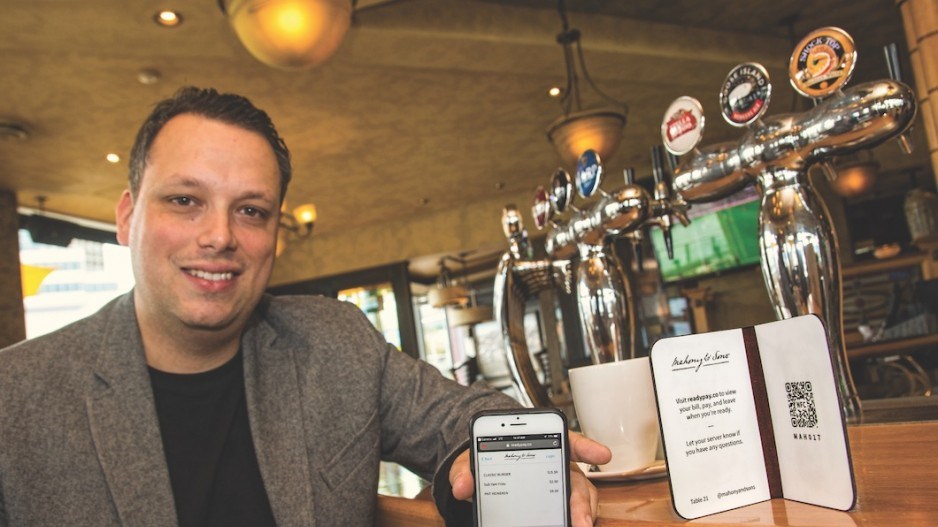Metro Vancouver’s severe shortage of hospitality workers has restaurant owners tweaking business plans and looking to new technology to operate efficiently with fewer servers.
Fast-food restaurants have long been adopting self-serve kiosks to enable customers to order meals without speaking with restaurant employees. Pubs and more casual restaurants are starting to test technology to allow customers to order food and pay bills from their smartphones.
Two Vancouver companies – Glance Technologies Inc. and iQmetrix-owned Ready – offer competing technologies to allow restaurant patrons to pay bills using smartphones. Both also intend to offer technology in restaurants that enables customers to order meals with smartphones and have those meals delivered to tables by servers or have counter staff call out names.
“They probably got the idea [for ordering food by smartphone] from us,” said Glance CEO Desmond Griffin, who in June staved off a boardroom coup attempt.
“We announced plans for that a long time ago.”
Glance, however, has yet to offer the food-ordering option to customers while Ready unveiled that technology at a trade show in Florida on October 1.
Glance Technologies is the bigger player of the two, as owners of more than 500 restaurants in B.C., Alberta and Ontario allow customers to use Glance’s app to pay bills via smartphone, Griffin told Business in Vancouver.
The company added 59 new locations that are using its technology in the quarter that ended May 31.
Most of its client restaurants provide paper bills to customers, who take a photo of a QR code on their bill. The app invites customers to enter credit card details or pay via Apple Pay or Google Pay. Griffin said restaurants are charged a range of fees, depending on size, volume and the kinds of credit cards that customers use.
Glance has started to provide technology to some restaurants that have advanced point-of-sale systems to allow customers to scan QR codes at tables and be taken directly to a digital bill. That way, the server need not drop a paper bill at the table, Griffin said.
That approach is similar to the way that Ready’s technology works.
One difference between technologies offered by Glance and Ready is that Ready does not require customers to first download an app.
“There’s a lot of friction on the app side,” explained Laurent May, who heads the seven-employee Ready. “Downloading an app just to make a payment in a restaurant without any incentives? There’s a lot of barriers to have customers doing that.”
Restaurants such as Mahony & Sons’ convention centre location, Ceili’s Irish Pub in Richmond and Burrard Public House in Port Moody allow patrons to use Ready technology to pay bills. May said Ready charges restaurants owners a 2.9 per cent fee plus $0.30.
No restaurant in Vancouver is currently using Ready’s new food-ordering technology. However, Tap & Barrel Restaurants owner Daniel Frankel told Business in Vancouver that his restaurant chain has been testing Ready’s bill payment and ordering technology at his Brewhall restaurant but that it is not yet available for the public.
Brewhall opened this summer and has an innovative business plan for a large pub in that customers are expected to go to a counter to order meals. Frankel said that if Ready’s technology gets the green light, likely within a month, customers will be able to order drinks and meals by smartphone so they can bypass what can sometimes be long drink lineups.
Brewhall’s counter-service business plan means that Frankel can employ about 95 staff for what he said was a 400-seat restaurant. Had he chosen to offer table service, Frankel said he would have had to find and hire more than 200 employees.
“We’re trying to stress-test the technology before we make it available to the public,” Frankel said. “We just want to make sure that the tech is not glitchy and we have no lost orders.”
Other pub chains, such as Blueprint’s Colony chain, for example, are in no hurry to implement technology to reduce the need for servers.
Blueprint director of people and culture, Hanna Jane Price told BIV that training allowances, bonuses and starting wages at $15 per hour for kitchen staff are instead its strategy to attract the necessary workforce to operate its three Colony pubs and its Charles Bar.
“Our customers haven’t really shared any desire to lean on the tools that you’ve described, like automatic ordering” Price said. “It’s more about the vibe when they walk in. It’s more of a community pub [feel.]”



